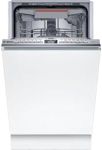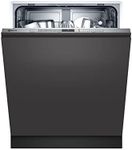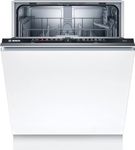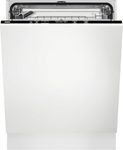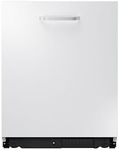Buying Guide for the Best Integrated Dishwashers
Choosing the right integrated dishwasher involves understanding your specific needs and the features that will best meet them. Integrated dishwashers are designed to blend seamlessly with your kitchen cabinetry, providing a sleek and uniform look. When selecting a dishwasher, consider the size of your household, the types of dishes you frequently use, and your cleaning habits. By focusing on key specifications, you can find a model that offers the right balance of performance, efficiency, and convenience.Size and CapacitySize and capacity refer to the physical dimensions of the dishwasher and how many place settings it can accommodate. This is important because it determines how much you can wash at once and whether the appliance will fit in your kitchen space. Dishwashers typically come in standard sizes, but the interior capacity can vary. For a small household or limited kitchen space, a compact model might be sufficient. Larger families or those who entertain often might prefer a full-size model with a higher capacity. Consider your kitchen layout and the volume of dishes you typically need to clean when choosing the right size.
Energy EfficiencyEnergy efficiency indicates how much electricity and water the dishwasher uses. This is important for both environmental impact and utility costs. Dishwashers are rated with an energy efficiency label, often ranging from A+++ (most efficient) to D (least efficient). If you are environmentally conscious or want to save on energy bills, look for models with higher efficiency ratings. Consider how often you run your dishwasher; frequent use makes energy efficiency even more crucial.
Noise LevelNoise level measures how loud the dishwasher is during operation, typically in decibels (dB). This is important if your kitchen is near living areas or if you run the dishwasher at night. Dishwashers can range from very quiet (around 40 dB) to quite noisy (over 60 dB). If you value a quiet home environment, especially in open-plan living spaces, opt for a model with a lower noise level. Consider your household's routine and whether noise might be disruptive.
Wash Programs and FeaturesWash programs and features refer to the different settings and options available for cleaning your dishes. This is important for flexibility and convenience in handling various types of dishware and levels of soiling. Common programs include eco, quick wash, and intensive cycles. Some models offer additional features like half-load options, delay start, or steam cleaning. If you have diverse cleaning needs or specific preferences, look for a dishwasher with a variety of programs. Consider the types of dishes you wash regularly and any special requirements you might have.
Drying PerformanceDrying performance indicates how well the dishwasher dries your dishes after washing. This is important for convenience and to prevent water spots on your dishware. Different models use various drying methods, such as heat drying, fan-assisted drying, or condensation drying. If you prefer your dishes to be ready to use straight from the dishwasher, look for models with strong drying capabilities. Consider how important it is for you to have completely dry dishes and whether you are willing to manually dry any items.
Build Quality and DurabilityBuild quality and durability refer to the materials and construction of the dishwasher, which affect its longevity and reliability. This is important for ensuring that your appliance will withstand regular use over time. Look for models with stainless steel interiors, which are more durable and resistant to stains and odors than plastic. If you plan to use your dishwasher frequently, investing in a model with a robust build can save you from future repairs or replacements. Consider how often you use the dishwasher and the importance of long-term reliability.

